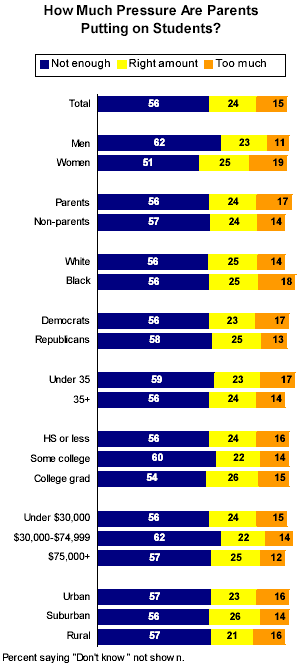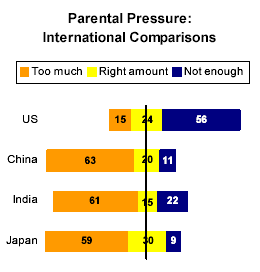by Richard Wike and Juliana Menasce Horowitz

Have American parents become too pushy about their kids’ education? Many experts seem to think so, judging from several new books by journalists and psychologists that bemoan the growing pressure students feel to do well in school. But at least one group of non-experts — the American public — begs to differ. According to a Pew Global Attitudes survey, most Americans think parents are not pushing their children hard enough.
By a ratio of nearly four-to-one, adults in this country say that American parents are placing too little (56%) rather than too much (15%) pressure on students, with the remaining quarter (24%) saying that parents are exerting the right amount of pressure. Parents and non-parents feel roughly the same way about this question, the survey finds. So do Republicans and Democrats, blacks and whites, older adults and younger adults, people with low incomes and those with high incomes, and people with college degrees and those with a just a high school education or less. The only demographic gap in attitudes about this question — and it’s not especially wide — comes on the gender front. More men (62%) than women (51%) say parents aren’t being tough enough.
To find more substantial differences in attitudes about parental pressure on students, one needs to look east. Far East. When the same question was posed in China, India, and Japan about parents in those respective countries, the results were the mirror image of those found in the United States.1
In these three Asian countries, solid majorities say children are under too much pressure from parents, and very few believe children face too little pressure. The surveys were conducted from March to May, 2006.

Many Asian countries are known for rigorous educational systems that place heavy pressure on students to perform well on high-stakes university entrance exams and in international academic competitions.
In Japan, for example, parents often send their children to private juku, or “cram schools,” where they spend many hours beyond the regular school day supplementing their studies and preparing for college entrance exams. When the Japanese government recently took steps to reduce student workloads, it met with criticism from parents concerned about the country’s drop from first place in 2000 to fourth place in 2003 on the Program for International Student Assessment (PISA) mathematics literacy test.
Roughly six-in-ten Japanese (59%) say all this pressure is too much, while 30% feel the demands are about right. Only 9% say students need more parental pressure — a figure that stands in stark contrast to the 56% of Americans who feel this way about students here.
In an email exchange, author Alexandra Robbins, whose book, The Overachievers: the Secret Lives of Driven Kids, focuses on the United States but includes a chapter on Asia, noted that “exam fever” is widespread in Asian countries. “In Asia, unlike the U.S., the college you attend can mean the difference between a distinguished professional career or a life of menial labor,” she wrote.
Even so, Robbins’ book is one of several that argues that Americans students are under growing pressure to perform well at school. “I strongly believe,” she says in her email, “that the American public isn’t aware of just how much pressure children are feeling, because many parents don’t necessarily pressure intentionally.”
There’s a debate in education circles about whether this pressure is being felt around the country, or whether it tends to be confined to upper income areas such as Bethesda, Maryland, where Robbins conducted most of her research. Recent studies by the RAND Corporation and the Brookings Institution have found that American students average less than one hour each night on homework, hardly the demanding schedule of an overstressed juku student. And American students generally rank far below their Japanese counterparts on international tests. For example, the U.S. placed 24th out of 29 developed countries on the 2003 PISA math literacy test and 19th on the science literacy test. So perhaps the public is on to something.




